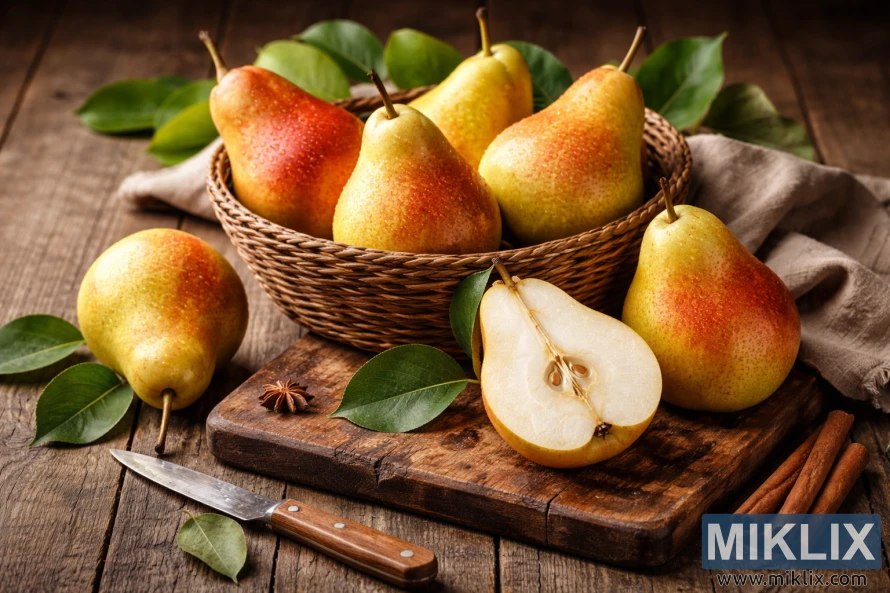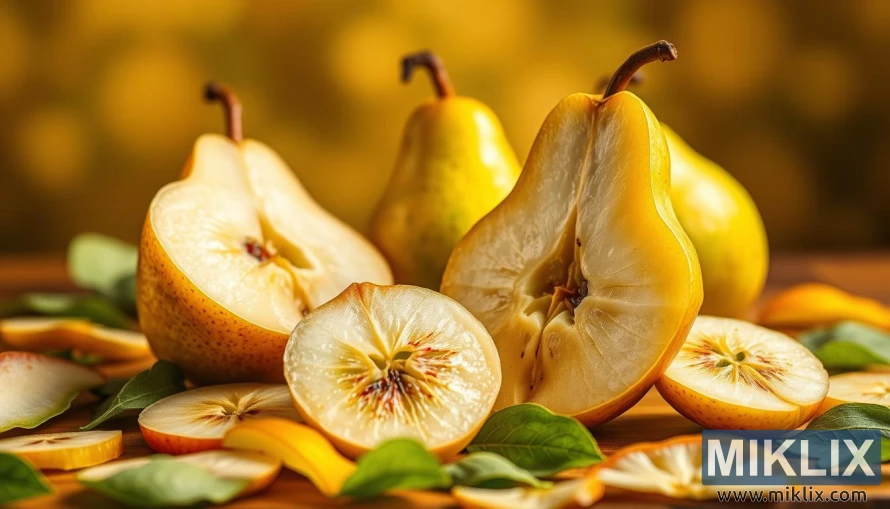From Fiber to Flavonoids: The Healthy Truth About Pears
Published: May 12, 2025 at 7:44:36 PM UTC
Last updated: December 27, 2025 at 5:43:05 PM UTC
Pears are not just tasty; they're packed with nutrients. They have vitamins, minerals, and fiber that boost your health. Eating pears often can fight off chronic diseases. This article will show you several health perks of pears and how to eat them more.

Key Takeaways
- Pears are rich in essential nutrients, making them a highly nutritious fruit.
- Eating pears regularly may help with various chronic disease prevention.
- Pears promote gut health due to their high fiber content.
- They contain beneficial plant compounds associated with increased health.
- Pears have anti-inflammatory properties that can contribute to improved health.
- The possible anticancer effects make pears an excellent choice for your diet.
- Pears can play a role in effective diabetes management.
Highly Nutritious Pears
Pears are a nutritional powerhouse. A medium pear has about 101 calories, making them a low-calorie snack. They provide 1 gram of protein and 27 grams of carbs, giving you energy.
They also have about 6 grams of fiber. This helps with digestion and keeps you full longer.
Pears are full of vitamins and minerals. They have vitamin C and vitamin K, which are good for your immune system and bones. They also have potassium and copper, which are important for your body.
They also have folate, niacin, and provitamin A. These help your cells and skin. Plus, the skin of pears has polyphenols, adding to their health benefits.
Promotes Gut Health
Pears are great for your digestive health because of their high fiber content. A medium pear has about 6 grams of fiber. This meets about 21% of your daily fiber needs.
The fiber in pears helps keep your gut healthy. It supports regular bowel movements and improves digestion.
Pears contain soluble fiber, like pectin, which helps with constipation. This fiber absorbs water, making stools softer. It also helps them move through your digestive system more easily.
Pectin also encourages the growth of good bacteria in your gut. This is key for a healthy microbiome.
To get the most fiber, eat the pear's peel. The skin has a lot of the fruit's fiber. Adding pears to your diet can boost your gut health. They're tasty and good for you.
Pears and Beneficial Plant Compounds
Pears are packed with good stuff that helps your health. They have anthocyanins, flavonoids, and other antioxidants. These are found mostly in the skin, so eating pears with the skin on is best.
The anthocyanins in red pears are good for your heart. They help lower inflammation and improve blood flow. These pigments also give pears their bright color and protect your heart.
Green pears have lutein and zeaxanthin, which are great for your eyes. These compounds act as antioxidants, helping to keep your eyes healthy. Eating pears regularly means you get these important nutrients.

Anti-Inflammatory Properties of Pears
Chronic inflammation can lead to serious health problems like heart disease and diabetes. Eating pears can help because they are full of flavonoids. These compounds have antioxidant properties that fight inflammation in our bodies.
Studies show that eating more flavonoids can lower the risk of heart disease and diabetes. Pears also have vitamins C and K, and copper. These nutrients work together to fight inflammation. This makes pears a great choice for staying healthy and managing inflammation.
Potential Anticancer Effects of Pears
Recent studies show that pears might help fight cancer. They contain compounds like anthocyanins and chlorogenic acid. These help protect against some cancers.
Research suggests eating pears could lower lung and stomach cancer risks. This makes pears a great choice for a healthy diet.
Pears are also packed with flavonoids, which are antioxidants. These help fight oxidative stress in the body. This could help prevent cancer cells from growing.
While more research is needed, adding pears to your diet is a good start. It's a step towards a balanced diet that fights cancer.
Pears and Diabetes Management
Pears are a tasty way to help manage diabetes, thanks to their high fiber content. Fiber helps keep blood sugar levels in check. This makes it easier to control blood sugar.
Red pears are special because they have anthocyanins. Eating fruits rich in anthocyanins, like pears, can lower the risk of type 2 diabetes by 23%.
Pears have a low glycemic index. This means they don't cause blood sugar to spike. Adding pears to your diet can be a delicious and healthy choice.

Heart Health Benefits from Eating Pears
Pears are great for your heart. They are full of nutrients that help keep your heart healthy. Eating pears can lower your risk of heart disease.
They contain special compounds called procyanidins and quercetin. These might help make your arteries more flexible. They also help manage cholesterol levels.
A study showed eating two medium pears a day can lower heart disease risk. Pears are packed with antioxidants. These fight off harmful stress in the body.
Adding pears to your diet might also lower your stroke risk. They are rich in fiber, vitamins, and minerals. Plus, they have plant compounds that are good for your heart.
Pears as a Weight Loss Aid
Pears are a great choice for those trying to lose weight because they are low in calories. They are full of fiber and water, which helps with digestion and keeps you feeling full. This makes it easier to eat less and avoid overeating.
Studies show that eating pears can help you lose weight. One study found that people who ate two pears a day lost about 0.3 inches from their waist in 12 weeks. This shows how important it is to include low-calorie foods like pears in your diet.
Eating pears can help you keep a healthy weight over time. Their natural sweetness can curb cravings while providing important nutrients without too many calories. This makes them a good choice for anyone trying to manage their weight.
Easy Ways to Include Pears in Your Diet
Pears are a delightful fruit that can easily enhance your meals and snacks. They are versatile, making them great for many diet inclusion strategies. Plus, they add unique flavor and health benefits.
Here are some creative snack ideas and ways to enjoy cooking with pears:
- Enjoy pears whole as a convenient and nutritious snack.
- Slice them into salads for a refreshing twist.
- Add diced pears to your morning oatmeal for extra sweetness.
- Blend pears into smoothies for a delicious and creamy texture.
- Try roasting or poaching pears to elevate their aroma and flavors.
Incorporating pears into pear recipes can be an exciting culinary adventure. They pair wonderfully with a variety of ingredients like:
- Cheeses, such as blue cheese and goat cheese, for a perfect appetizer.
- Spices like cinnamon or nutmeg to create warm desserts.
- Meats, adding a touch of sweetness to dishes like pork or chicken.
Remember to eat pears with the skin on for maximum nutrition and flavor. Enjoy the delightful possibilities that this fruit brings to your diet!
Pear Varieties You Should Try
Exploring different pear types is both tasty and rewarding. Many pear varieties stand out for their unique flavors and textures. Bartlett, Bosc, D’Anjou, Asian, and Comice are some of the most popular. Each variety offers a unique taste, making it fun to try them all.
Bartlett pears are sweet and juicy, perfect for snacking or desserts. Bosc pears have a brown skin and a firm texture with a deep, spicy flavor. D’Anjou pears are versatile, great in salads or eaten raw because of their smooth texture and mild taste.
Asian pears offer a crunchy bite like apples, making them refreshing for salads or as a snack. Comice pears are known as the dessert pear for their rich sweetness. You can find these varieties at both grocery stores and farmer's markets, making it easy to add variety to your meals.
Trying different pear varieties can make simple dishes more exciting. It opens up endless possibilities in the kitchen. Don't be afraid to experiment with these fruits for a rewarding culinary adventure.
Seasonal Availability of Pears
Pears are delightful seasonal fruits that captivate the taste buds with their sweet and juicy flavor. The pear harvest season typically runs from late summer through early winter. Fall is the peak time for enjoying these delicious fruits. Knowing when to buy pears can make a significant difference in taste and quality.
During the harvest season, grocery stores and farmers' markets are often brimming with a variety of fresh pears. This seasonal abundance not only enhances the flavor but also boosts the nutritional benefits associated with consuming these fruits. Consumers can enjoy the freshest pears, maximizing both taste and health benefits.
Even though pears have a specific harvest window, advances in storage technology allow them to be available year-round. Understanding when to buy pears ensures that you are choosing fruits at their best. So, as the seasons change, keep an eye on your local offerings to make the most of this luscious fruit.
Environmental Benefits of Pear Orchards

Pear orchards are key in promoting sustainable farming. They help make farming better for the environment. These orchards improve local ecosystems and make the environment healthier in many ways.
Pear orchards are great for biodiversity. They offer homes for bees and birds, among others. The variety of plants around pear trees creates a rich ecosystem. This benefits both farming and nature.
These orchards also make the soil better. Pear tree roots hold the soil in place, stopping erosion. Their leaves add organic matter, improving soil health. This boosts soil structure and plant growth.
Lastly, pear orchards help fight climate change. Trees absorb carbon dioxide, reducing global warming effects. This shows how farming can be both productive and good for the planet.
Allergies and Intolerance to Pears
Pears are a nutritious fruit for most people. But, some may develop pear allergies or food intolerance. Symptoms can vary a lot, affecting how people feel when eating pears.
People who are sensitive to other fruits might react more to pears. Foods with similar proteins can cause a reaction. It's key to watch how your body reacts after eating.
If you think you have a pear allergy or intolerance, see a healthcare provider. They can help figure out what's causing your symptoms. This can lead to better management and clearer dietary choices.
Conclusion
Pears are not just tasty; they're also packed with health benefits. They help with gut health and weight management. This makes them a great addition to any diet.
So, why eat pears? They're sweet and full of nutrients. Adding them to your meals is easy and healthy.
To get the most from pears, eat them with the skin on. It's where most of the nutrients are. So, make pears a part of your daily diet for their taste and health perks.

Further Reading
If you enjoyed this post, you may also like these suggestions:
- Hydrate, Heal, Glow: Unlocking the Benefits of Hyaluronic Acid Supplements
- Kombucha Culture: How This Fizzy Ferment Boosts Your Health
- Sweet Potato Love: The Root You Didn’t Know You Needed
